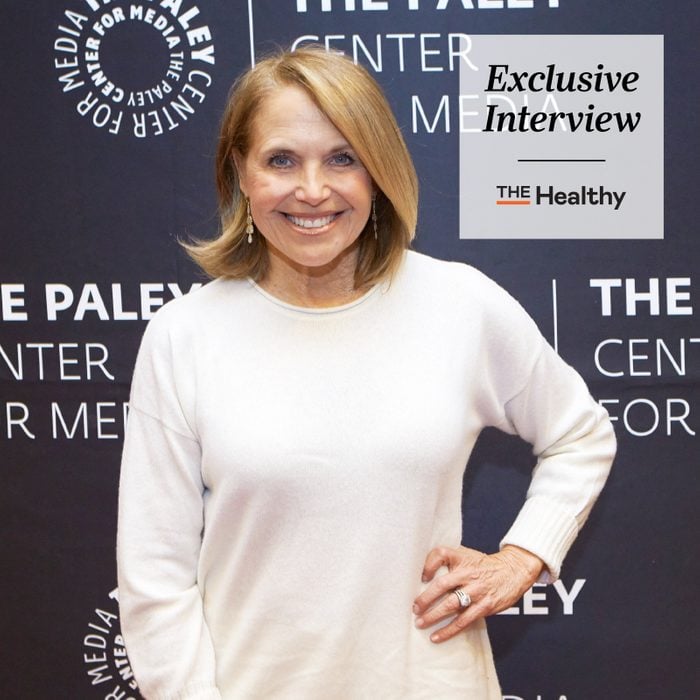Why Katie Couric Says Being a ‘Little More Neurotic’ About Health These Days Is Smart
Updated: Mar. 27, 2023

"Aging is not always easy. It's not for the faint of heart, as they say. But I've lost so many people, I feel blessed to age," says Couric. "If you're lucky, it happens to everybody."
Colon cancer is on the rise in people younger than 50. This is a particularly alarming fact for someone like Katie Couric, who has been advocating for screening and early detection since losing her husband, Jay Monahan, to colon cancer 25 years ago.
On March 16, 2023 at New York City’s Paley Center Podcast Studio in front of an intimate live audience, Couric spoke with Memorial Sloan Kettering Cancer Center oncologist Dr. Diane Reidy-Lagunes for a recording of the podcast Cancer Straight Talk from MSK. In between a host of events Couric led for National Colon Cancer Awareness Month—and running Katie Couric Media (which includes her popular daily newsletter, “Wake Up Call,” her news website and podcast, Next Question)—Couric spoke with The Healthy @Reader’s Digest to discuss how to break the taboo around colon cancer, aging without judgment and how losing her husband affected her view of her own health.
This Zero-Calorie Sweetener Was Just Linked to Heart Attack and Stroke
Katie Couric on Colon Cancer Awareness month
The Healthy @Readers Digest: Studies consistently show that women are more likely to visit the doctor than men and are better at screening and preventative care. You’ve always said that screening and early detection are so important to fight this disease. So what do you think we can do to change this and get more men to the doctors?
Katie Couric: My husband didn’t have an internist when he was diagnosed with stage four colon cancer. I think one of the reasons women are more proactive in terms of taking care of their health is that they go to their OB/GYN and they go for annual checkups. And because men don’t have that, I think sometimes they feel like they’re healthy, or they exercise and they have good diets, so they don’t need to go to the doctor. And that’s just insane. Men need to go to the doctor. Men need to get annual physicals.
The Healthy: It’s currently National Colon Cancer Awareness month, but I feel like we still don’t hear as much about it as compared to say, breast cancer, which gets so much attention. And even though, of course, that’s equally important, colon cancer is on the rise in people younger than 50. You’ve played a huge role in bringing attention to this cause, but what else can we do to break the stigma around talking about parts of our body that maybe make people feel uncomfortable?
Couric: I think talking about it. Talk about it till we’re blue in the face. Talk to your friends about it, talk to your family members about it. It’s ridiculous that people feel uncomfortable talking about this essential part of our bodies that we all have, and that, like every other part of our body, needs to stay healthy. I used to read my daughters a children’s book called “Everybody Poops.” And, you know, I think we have to just talk about it and be open about it. Colorectal cancer is the number two cancer killer of men and women combined just after lung cancer. And I think breast cancer had a built-in advocacy base early on, they were organized and they normalized the word “breast.”
Natural Colon Cleanse: 4 Strategies to Try at Home

Katie Couric on how she manages her own health
The Healthy: This is obviously an important platform to you, because you lost your husband to colon cancer 25 years ago. I imagine that was quite horrible and shocking. How did the experience affect your view of your own health at the time?
Couric: I’ve always been proactive about my health, but it made me even more proactive, knowing that I was a single parent and knowing that I didn’t want my daughters to become orphans. And so I probably became a little more neurotic about my health. And I think my doctors also became a little more neurotic about my health on my behalf, because they knew the situation.
The Healthy: What did neurotic look like to you?
Couric: It wasn’t to the point of being a hypochondriac, but just really ensuring that everything’s okay. That I’ve tested and done everything on time. Although, you might have read that I was six months late for my mammogram. I was diagnosed with breast cancer last summer. And I think like so many people with COVID and the pandemic, my sense of time and my schedule just got all out of whack. And, by the way, you couldn’t get in to get some of these diagnostic tests for a while. So I’ve tried to really, really take care of myself through the years. But it also made me want to really share with other people my experience, whether it was getting a colonoscopy on national television, raising money for colorectal cancer research, talking about it, having benefits, going on television, being interviewed, like I am now, because I wanted to make sure people knew how preventable this disease is with early detection. And so it set me off on a life mission, really.
Jewel’s Got a New Title To Take On Mental Health—In the Metaverse
Katie Couric’s “fountain of youth”
The Healthy: And how do you feel now in terms of your own health? What does staying healthy look like in terms of your routine and rituals or treatments?
Couric: I’m one of those people who doesn’t do a lot of quote-unquote self care. I mean, I take care of myself in terms of my doctor’s appointments and I try to exercise and I go to Pilates three times a week. But for me, the fountain of youth lies in your social relationships and in being engaged with life or being insatiably curious, caring about other people and deep lasting friendships. I think my self care isn’t actually about myself. It’s about, hopefully, other people.
The Healthy: Is there one routine that you do every day and refuse to skip?
Couric: No.
The Healthy: That’s fair. We ask it to everybody.
Couric: Is that terrible? Should I make something up?
The Healthy: Not at all. I appreciate the honesty.
Couric: I always have a spinach smoothie in the morning. [laughs] No, I don’t, which is terrible. But I try not to feel guilty because I think guilt is bad. I try to drink a lot of water because I have really dry skin.
The Healthy: You can’t go wrong with water.
The Healthy: There’s been a lot of debate recently on the expectations of how a woman is supposed to age, what they should look like, how they should speak about their bodies. What’s been your experience growing older in the spotlight?
Couric: I think that I’ve just tried to enjoy every stage of life I’m in. I think people should be free to do whatever they want and handle aging however they see fit. I think there’s enough judgment in our society that I’m all for the ‘you do you.’ You know, aging is not always easy. It’s not for the faint of heart, as they say. But I’ve lost so many people, I feel blessed to age. Jay died at 42, my sister died at 54. I’ve had friends who die in their 40s so I see it as a gift. And I just think we as a culture spend too much time thinking and talking about our exteriors, and not enough time focused on our interior selves. I think Mother Nature takes care of you, because the older you get, the less you can see! I often look in the mirror and think I look pretty good. Then I put on my reading glasses and I’m like, “Oh, my God, what happened?” But, you know, it’s just part of life. If you’re lucky, it happens to everybody.
